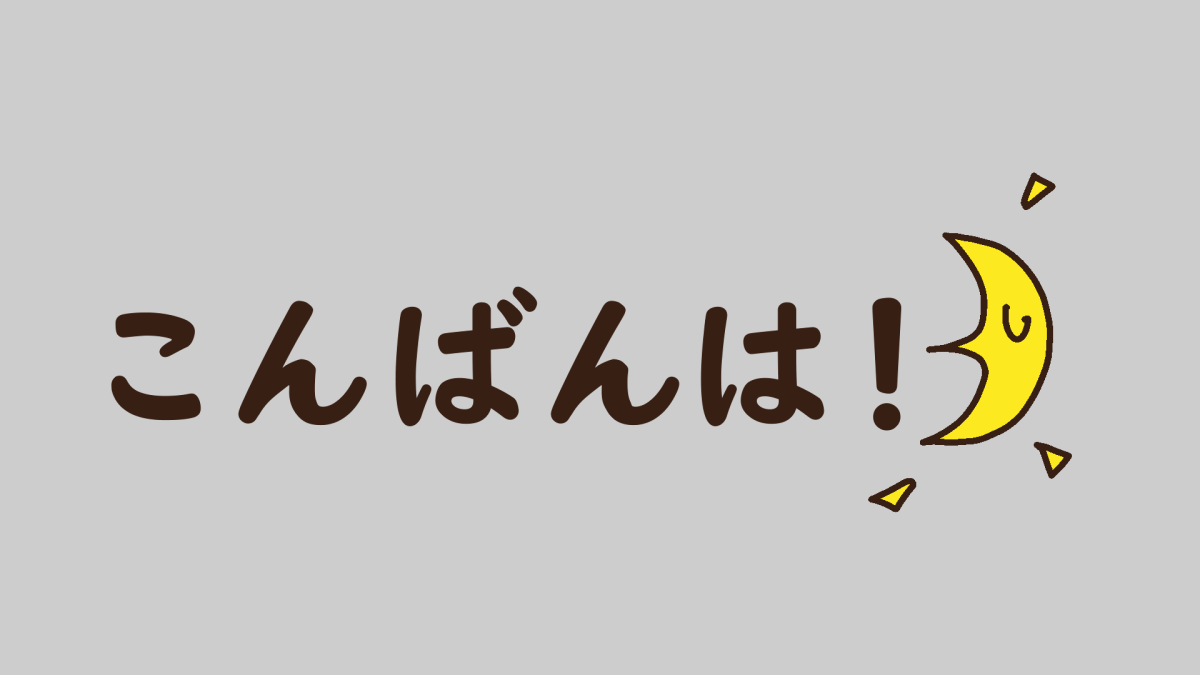The Japanese language is known for its cultural richness and linguistic nuances. One of the most common and well-known expressions is "Konbanwa" (今晩は) and "Oyasumi" (お休み), which are often translated as "good night". However, as with many aspects of Japanese culture, there is more to this simple greeting than meets the eye. In this article, we'll explore the true meaning of "Oyasumi" and understand the cultural context that surrounds it.
We also recommend reading:
- What is the meaning of Ohayou Gozaimasu?
- Konnichiwa – Good Afternoon in Japanese – Origin and Meaning
- 50 Ways to Say “Hi” and “Hello” in Japanese
Table of Content
Origin and Meaning of Konbanwa
The word "Konbanwa" is composed of three elements: "kon" (今), which means "this" or "current"; "ban" (晩), meaning "night"; and "wa" (は), the topic particle. Together they form an expression that translates as "this night" or "in relation to this night". "Konbanwa" is a greeting used to greet someone at night and not to say goodbye, unlike "Oyasumi".
“Konbanwa” is used as an evening greeting when meeting someone or starting a conversation in the evening, usually after sunset or early evening. The salutation is appropriate in a wide variety of contexts, from casual gatherings with friends and family to more formal situations such as business meetings or social events.
Like other Japanese greetings, “Konbanwa” also reflects the importance of respect and etiquette in Japanese culture. By using “Konbanwa” to greet someone at night, you are acknowledging and respecting the time of day and changing atmosphere, showing consideration and courtesy.

Origin and Meaning of Oyasumi
"Oyasumi" (おやすみ) is a shortened form of "Oyasuminasai" (おやすみなさい), which is the more formal and complete version of the expression. The word is composed of two parts: "oya" (親), which means "father" or "mother", and "yasumi" (休み), which means "rest" or "vacation". Together they create a deeper meaning, suggesting a message of "father's rest" or "blessed rest".
The word "Oyasumi" not only wishes someone a good night's sleep, but also implies a sense of parental care and protection, as if blessing one's rest. The use of “Oyasuminasai” instead of “Oyasumi” is more appropriate in formal situations or when talking to someone older or higher in rank, showing respect.
The expression "Oyasumi" is used in various situations, such as when one says goodbye to friends, family or co-workers at the end of the day or when saying goodbye after an evening conversation. Also, it is common on television or radio programs where presenters wish viewers or listeners a good night as they end their broadcasts.

Variations and Alternatives to Oyasumi
There are other forms and variations of "Oyasumi" that can be used in different contexts. "Oyade" (おやで) is a casual form of "Oyasumi" that can be used between close friends and family.
Another related expression is "Oyasumi oyasumi" (おやすみおやすみ), a repetition of the word "Oyasumi" to emphasize the desire for a good rest and is mostly used for children.
There are other ways to say good night in Japanese when saying goodbye, depending on the context and the level of formality of the situation. Here are some alternatives:
- お休みください (Oyasumi kudasai) - This expression is another variation of "Oyasumi" and means "please rest". It's a more polite and respectful way to wish someone a good night.
- よい夢を (Yoi yume o) - This expression means "sweet dreams" or "have sweet dreams" and is an alternative way of wishing someone a good night, focusing on pleasant dreams.
- May it be a peaceful night. This is a more poetic and literal expression meaning "may you have a good night's sleep". It can be used to wish someone a peaceful and restful night.
- お疲れ様でした (Otsukaresama deshita) - This expression is mainly used in the work environment or among colleagues to say thank you for the effort of the day. It translates to “thank you for your hard work” and can also be used as a farewell greeting when leaving the office or ending a meeting.
- ごきげんよう (Gokigenyou) - This is a classic, formal greeting that can be used both when greeting and when saying goodbye to someone. It is most common in formal, traditional settings such as tea ceremonies or cultural events.
- じゃあね (Jaa ne) - This is a casual, colloquial farewell that can be translated as "see you later" or "see you later". It is used between friends and close people and can be said at any time of the day, including at night.
- また明日 (Mata ashita) - This expression means "see you tomorrow" and can be used as a farewell greeting when you hope to see the person again the next day. It works well in both casual and formal contexts.
